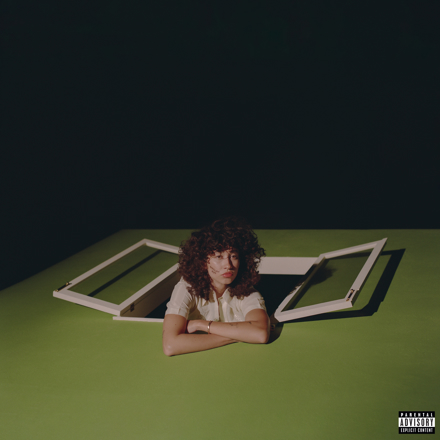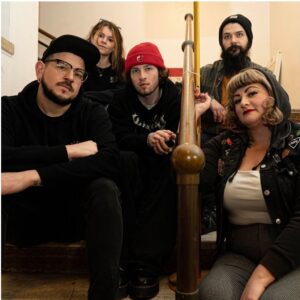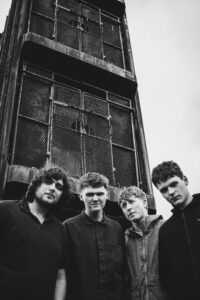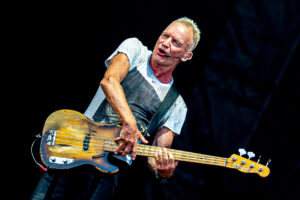TOWA BIRD FLIES HIGHER WITH SWOOPING ALBUM DEBUT ‘AMERICAN HERO’

ALBUM REVIEW | TOWA BIRD – AMERICAN HERO by Martha Munro | 4/5
With her ever-growing and ever-adoring fan base eagerly awaiting her every musical move, the pressure was most certainly on for 25-year-old artist Towa Bird in the lead-up to her debut album release. Her career has gained enormous traction after opening for and playing guitar on her girlfriend Reneé Rapp’s tour and the smattering of singles released across this year and the last have all been in anticipation of this garage-punk, bedroom-party, coming-of-age-esque debut album American Hero.
The short, atmospheric first track Intro is the perfect excitement-builder – and personality-builder – to establish the whole work as an event-listen, spotlighting two of Bird’s greatest loves: the guitar and the crowd. The live-audience effect only intensifies the thrill of that very first electric guitar twang, catapulting the listener into the pop-punk explosion of second track FML. This song is liberally coated in Bird’s characteristically frenetic yet refined sound, using a low, amped-up bass and expertly crafted and placed guitar licks – both of which are played by Bird throughout the album – to give the song that earthy, solid sonic support. The use of contrasting vocal layers on the hook and the radio-esque, static quality given to the backing vocals create a soundscape that centralises Bird’s smooth voice without it coming across as domineering. Variations in drum patterns across the song’s trajectory also provide sonic diversity, resembling Bird’s break from restrictions as well as her drive to musically narrate the joys and nuances of queer love, creating romantic hits away from the male-gaze and kicking off the album with a full embrace of all the human emotions yet to come; immediately, the line “I got ideas” couldn’t be more apparent.
The next four songs consist of the previously released and loved singles Drain Me!, Wild Heart, Sorry Sorry and B.I.L.L.S.. Electro-track Drain Me! kickstarts this quartet, furthering the sense of fun from the previous track but with slightly less frenzy. The dynamic lyrical contrasts are really what make Drain Me! stand out, with sliding sentiments making up the first verse and a biting, alliterative, teeth-sucking edge overtaking in the second. The artist’s first ever release Wild Heart is up next and the quick tempo, indie-esque sound and echoed vocals communicate Bird’s rise to her true sound and audience. The satisfying guitar motif and drum variations provide some diversity in a chorus that could otherwise seem repetitive, keeping the listener’s interest bouncing from drum-skin to drum-skin. Fifth track and latest single Sorry Sorry brings the previously heard elements of 2000s pop to their summiting height with varied use of percussion and some friends-to-lovers angst. The song finishes off with a juxtaposing, raw reduction to the vulnerable duo of Bird’s vocals and a singular electric guitar line – but it has to be said that the album harbours some repetitiveness with this number. Whilst the hook is undoubtedly catchy, the spark of originality that is so clear in the initial tracks feels slightly flattened here, allowing the sound to fall out of the artist’s hands. However, the following anthem B.I.L.L.S. quickly and confidently reminds the listener why Towa Bird is one to watch, hear and chant. This addictive, anti-capitalist internet-sensation of a single is so widely loved for a reason; the bassline is edgy and earthy, the unmistakable guitar riff irresistible and the lyrics rapid and ragingly relevant. Bird uses a smaller vocal range to subtly introduce a more spoken, conversational quality to this song, enhancing the husk in her voice as well as her deadpan sentiment of frustration, with abstract, money-associated sounds peppered in to amplify the punchy remarks about class divide. A defining feature of B.I.L.L.S. is its departure from the pop song formula as it doesn’t have a regular form. This sets this track apart by a mile from not only the rest of Bird’s own discography, but other popular earworm singles.

Following B.I.L.L.S is the garage/pop-punk explosion Deep Cut, a cathartic, blistering stand-out track even after the preceding hot hit. A rich anger enters the album here, particularly through the heavy cymbals and brief spoken sections of the lyrics, allowing Bird to access a full musical and personal spectrum of emotion as well as give the listener another flavour to taste. A creative highlight in this track occurs at a lyrical biblical reference point in the beginning of the second verse, when the sound subtly – and briefly – transforms to replicate the angelic sound of a church choir. It quickly smashes back into the grit of the song’s full sound, highlighting the crucial creativity of the various pop-producers who brought this whole album to life, including Alexander 23 (Olivia Rodrigo, Tate McRae), Luke Niccoli (Carly Rae Jepsen, Gwen Stefani) and The Naked and Famous’ Thomas Powers.
Highly anticipated and teased eighth track Ew embraces the sappy and the satirical, the confident and the self-conscious, the humour and the crush. With its heavy bass, percussive accents and fast tempo, Ew is the ultimate mosh-pit-mad anthem on American Hero. However, this song’s sense of youthful fun is contrasted in the following track Last Dance which was co-written with Deb Never and, through the acoustic guitar and rippling lines, is a much more authentic portrayal of sentimentality and, first and foremost, friendship; a theme and facet of herself that Bird specifically wanted to include with Last Dance in an album that’s more romantic-leaning. In the chorus, Towa Bird’s edgy vocal quality re-emerges from the smoothness of the first verse, featuring a louder, spoken quality to communicate longing, as if shouting across cities to the friend she sings about. Despite the fact that the artist’s defining sonic characteristics are by no means lost, the song doesn’t have much movement, making it sound repetitive, much like Sorry Sorry. However, Bird doesn’t let it stay this way for long and reminds us of her talent in a sliding, blinding guitar solo after the second chorus. Since taking up the guitar at the age of twelve, Towa Bird’s flashy yet flawless affinity for the guitar has become more and more of a trademark, with legendary inspirations such as Jimmy Page, Joan Jett, Jimi Hendrix and Prince.
Next up are two more pre-released singles Boomerang and This Isn’t Me that take us even deeper into Bird’s inspired world. The full-sounding landscape of Boomerang is achieved through its quick tempo and muted beginning, allowing for the full entrance a few bars in to make a bigger impact. This track is particularly influenced by Bird’s love for performing live, with collective claps supporting the main melody line as well as the sound of an applauding, enthused crowd entering towards the end. The star of this single-duo however is undoubtedly the dissociation deep-dive This Isn’t Me. Towa Bird wrote this song after attending Paris Fashion Week where she felt perpetually out of place. The heavy elements of synth in the introduction and the frequent sonic shifts from zero to a hundred throughout give a sense of disorientation, illustrating that out-of-body feeling which is present in both the instrumentation and lyrics, with conversational lines like “I’m not here“. Before the final chorus, the track reduces to a more demo-esque, live-sounding section, depicting the artist’s return to her authentic self, away from the showier aspects of the music industry.
The penultimate pop track May Flower is up next and returns to the focus on love and its prominence in Bird’s life. The essence is equally sentimental and fun, although, for a track that will leave the listener with one of their final impressions of the album, it’s not quite the engaging tune that would make it a stand-out. Despite this, closing track A Party does what May Flower doesn’t, stripping the sound right back to Bird and her guitar, this time an acoustic. Vocal layers maintain the sound’s fullness but aren’t overbearing to the vulnerability and contrasting simplicity in this final number, allowing the lyrics to take centre-stage. The lyric “At best we might get sad / At worst we’ll fall asleep” is a particularly striking one; the artist’s purpose with this debut – embracing and expressing every aspect of herself and the world around her – reaches its peak with this emotional painting of rawness, leaving the listener feeling closer to Towa Bird than ever before.
American Hero, whilst not flawless, is an undeniable floor-bouncer and heart-wrencher all in one. Bird takes the bad and the good, the angry and the joyous, the hard and the soft, and uses her artistry and authenticity to make crowd-pleasing, punchy, personal tracks – and they’re never not received with rapturous applause. After proving her promising career-roots and releasing this even more promising debut collection, the world can only dance on tenterhooks in anticipation of Towa Bird’s next moves.




